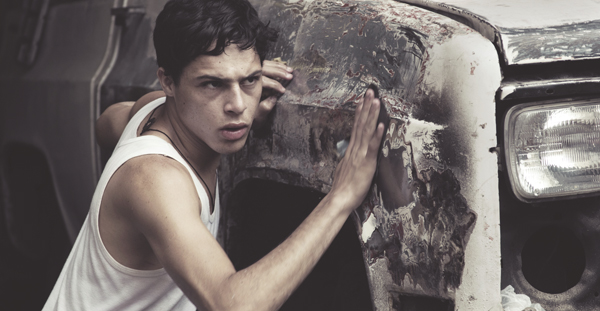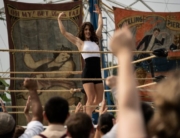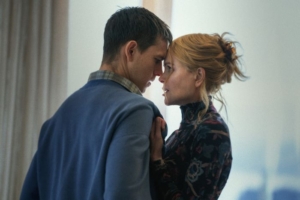One challenge at the Toronto International Film Festival is having enough time to check out films and directors that you may not know, in search of a gem that you (and thousands of others) can discover and claim as your own. Fortunately, a handful of shot-in-the-dark experiences were among the most memorable this year. A straight-on, lean-and-mean genre film from Belgium, The Ardennes offered one welcome surprise.
Kenny (Kevin Janssen) has just got out of prison for a robbery he committed with his then-girlfriend, Sylvie, and his older brother, Dave. He has served four years, and he has the facial scars to prove it. All that time, he never snitched, but for the last two years, Sylvie hasn’t visited him. In the first half, writer/director Robin Pront lays down the foundation for the chaos to come. During Kenny’s first day out of the big house, he follows Sylvie (Veerle Baetens) from her apartment to her AA meeting, which he crashes, resulting in a wince-producing confrontation. Tightly wound, Kenny uses his volatility as emotional blackmail to get what he wants. It’s little wonder that no one will fess up and tell him that Dave (Jeroen Perceval) and Sylvie are now a couple expecting their first child. Dave’s excuse isn’t original; he’s waiting for the right moment. In one of many telling touches, the brothers’ mother has photos of Dave throughout her home, but not one of Kenny.
At first, the tone echoes the melancholia of Sylvie—an atypical girlfriend role. Her sense of resignation colors the entire story. Considering a life with Kenny, she would rather be “dull” instead. At this point, the movie is like Ken Loach in the ‘hood, until midway. Then it gets weird. Wonderfully weird, when Kenny badgers his older brother to help him cover up a crime he has impulsively committed—and hold on to your hats. The kitchen sink drama takes a bizarre turn into David Lynch territory.
The brothers plan on hiding evidence of Kenny’s misdeed in the countryside, so into the Ardennes woods, where they spent their childhood, they go. There, Kenny reunites with his prison cellmate, Stef (Jan Bijvoet), who is strung out on coke and running around half-naked like a woodland creature. During the course of brothers’ bumbling and the resulting bloodshed, the director misdirects viewers with the slightest of hand. He works the audience over, but in the best sense. (In a bravura knockabout scene, this film demonstrates that the kitchen is the most lethal location for a fight.) It’s not unusual for overcommitted critics to leave one screening somewhere in the middle, thinking they have a handle on the movie. This would not be true for The Ardennes.
In terms of the Latin American films seen, this was a strong year. The night before its Toronto screening, From Afar (Desde Allá) won the Golden Lion, the top prize at the Venice Film Festival and a first for a Venezuelan film. It’s a fine representative of the current crop of formalist, stripped-down Latin American filmmaking.
Set in Caracas, the film promptly gets down to business when Armando, a blue-eyed fiftysomething man dressed like an entry-level accountant, sits down next to a lean teenage boy on a city bus and pulls out a wad of bills. He takes the youth to his dainty, fussy apartment, shelved with porcelain figurines, and in the living room, he orders the boy to take his shirt off and then to turn around and lower his pants, but not too far down, as Armando sits across the room, keeping his hands, ahem, to himself. (Viewers might recognize Chilean actor Alfredo Castro from Pablo Larrain’s Tony Manero.)
Armando’s next tryst hits a bump. He picks another street kid, who looks as though he’s still undergoing puberty. Back in Armando’s darkly lit apartment, the pouty-lipped young man, Elder (newcomer Luis Silva), refuses to follow directions, assaults Armando, and takes off with the man’s wallet and a figurine. His violent temper is not limited to older gay men; he and his street gang attack with pipes his girlfriend’s brother in a pool hall.
For bewildering reasons that are implied rather than clarified, Armando returns for more. He sees Elder on the street again and offers him more money, and the teen takes it and leaves. Days later, Armando’s wallet arrives, sans cash, in the mail. A sexualized cat-and-mouse game of rapprochements and reprimands follows, motivated by self-interest and self-loathing on the part of both men.
Armando’s passive-aggressive behavior is more often seen in female characters. He could be the male version of the psychologically stunted Isabelle Huppert in The Piano Teacher, a tightly wound observer keeping a distance from personal relationships. Looming in the background is an elusive father figure. Elder’s is in prison for killing his son’s friend; Armando’s has returned to city after a long absence. Armando has severed contact with him, yet he stalks a silver-haired and apparently wealthy man, presumably his dad.
At first glance, the duo’s actions are inexplicable. If ever the storyline moves in a more predictable direction, it’s only momentarily (Elder’s hostility toward Armando doesn’t last long). Building its power from insinuation, the film keeps audiences guessing about how it will end, but the clues are all there. Remarkably, this harsh and beautifully acted work is director Lorenzo Vigas’s first feature. Expect this slow-builder to have more of an impact post viewing.
Neon Bull, from Brazilian director Gabriel Mascaro, is a vibrant example of “slow cinema.” Though comprised of a series of beautifully framed static shots, it overflows with vitality. No backstories are offered, yet viewers gain a strong sense of who the characters are and witness an uninhibited look at a particular way of life. (A long sex scene challenges Blue Is the Warmest Color and the upcoming Love in its frankness. Another scene has a peculiar money shot.)
The director takes audiences down the back roads of the rodeo circuit, where, instead of using lassos, cowboys pull the running bulls down by the tail. The hair from the tails is pocketed by wrangler Iremar (handsome TV star Juliano Cazarré) and sewn in costumes he designs for his boss, bottle blond Galega (Maeve Jinkings), a single mother and the truck driver, mechanic, and cook for her small rodeo crew. She also moonlights as a go-go dancer in a custom-made equine costume by Iremar. The occasional surreal, sensuous sequences pose a sharp contrast to all the glimpses of branding, breeding, and the day-to-day restlessness and routine.
While one cowboy uses a girlie magazine to fulfill certain needs, Iremar draws a thong and a top on the photo of a nude female: he dreams of becoming a tailor in a clothing factory. This is just one example of how the film has fun at the viewers’ expense, playing mind games by upturning the expected gender roles. Iremar, resolutely a macho straight stud, worships women’s fashion. On the wall next to his sewing machine are magazine cutouts, with one of Elizabeth Taylor in Cleopatra drag. Iremar is also a substitute dad for Galega’s preteen daughter, who, based on what she observes of the adults around her, probably knows a lot more than she lets on.
About midway through, a sliver of story is introduced with the arrival of Junior, a younger, good-looking cow hand. Tension mounts, courtesy of Iremar, who’s threatened by another preening male. Self-assured Junior wears braces for cosmetic reasons and would rather take the time to iron his long, dark hair than join the others at the dinner table. (He has the Fabio look.) Whether or not this is your style of filmmaking, you are not likely to forget Neon Bull.
In addition to The Ardennes, there was something of a crime wave this year, what with Johnny Depp’s take on gangster/FBI informer James Bulger in Black Mass and two Tom Hardys for the price of one in Legend. Hardy stars as the twin gangsters Reggie and Ronnie Kray in this slick, brutal biopic, with tongue in bloody cheek.
First of all, this isn’t The Patty Duke Show with a body count or The Parent Trap of Death. Starting with the opening shot of the two brothers sitting together, the film quickly gets past the stunt casting. It’s as if writer/director Brian Helgeland immediately wants to confront the question of whether he and Hardy can pull this hat trick off, whether the movie will be convincing or camp. It works, though viewers might be fully aware of how rigidly delineated the two portrayals are, largely because Hardy clings to overused mannerisms as Ronnie.
The East End brothers’ dominance of London’s 1960s underworld and Soho nightlife was well covered only 25 years ago in the equally stylish The Krays, in which the men’s mother played a larger role. Here, she takes a backseat to Frances Shea (Emily Browning), Reggie’s wife and the film’s narrator. Though the movie is told from her point of view, she remains a nonentity onscreen, calmly and meekly making one bad choice after another.
Regardless of whether it’s time for a retelling, the new film is a showboating showcase for Hardy as Reggie, the suave Jack the lad, and mumbling Ronnie, the walking time bomb. (Unusual for the underworld milieu, Ronnie’s upfront about his homosexuality, though he clarifies that he’s a giver, not a receiver.) Hardy’s both the leading man and a character actor in one film, though subtlety goes by the wayside in his brash performance(s). It’s acting with a capital A. No one and nothing is safe, especially the chewed-upon scenery. Aside from Hardy’s attention-assaulting turn, the film takes few risks, following the familiar rise-and-fall trajectory.
It takes nothing away from Depp’s and Hardy’s formidable performances to say that the scariest crime boss, pants-soiling division, belongs to Guillermo Francella as the petty, robotic paterfamilias Arquimedes Puccio in Pablo Trapero’s creepy Argentinian family drama, The Clan, based on a real-life killing spree during the dark days of the early 1980s.
With pale green eyes, a shock of white blond hair, and jaundiced skin, the actor transforms into a dead-eyed Nosferatu as the ringleader of small-time hoods who kidnap wealthy friends and acquaintances (one is on his son’s rugby team) and hold them for ransom—in American dollars. However, as soon as Arquimedes and his gang collect the dropped-off cash, they execute their victims. (Viewers may think twice about helping a stranded motorist in need.)
All of Arquimedes’s targets are those he views as part of the leftist elite that ran the country to the ground. Living under a military junta, he had complete immunity. After the country’s disastrous invasion of the Falkland Islands and the economic free fall—a conflict and political development that are never directly referred to onscreen, in keeping with the script’s terse tone—the country takes steps toward democracy. However, though a remnant of the “Dirty War,” Arquimedes continues business as usual, but without the same autonomy.
The pumped-up editing mirrors a few tropes from the school of Scorsese: the jaunty pop tunes that accompany the planning and the carrying out of the violent abductions (the era-appropriate David Lee Roth cover of “Just a Gigolo”) and the crosscutting between contrasting actions: a hot and steamy backseat tryst between two young lovers and the execution-style murder of a hostage.
Unlike the other crime sagas mentioned above, this one doesn’t explicitly state all of the striving criminals’ motivations. As a result of the underwritten script, viewers may wonder how Arquimedes’s wife, two daughters, and three sons can feast on chicken and rice while ignoring the moans from a captive bound in the basement. Much of the film takes place in the Puccios’ ordinary, lived-in, and recognizably middle-class home, often around the dinner table, but not even the blaring radio in the cellar can drown out the cries.
At least in The Ardennes and Legend, loyalty is tested. Here, the youngest son, a teen, flies the coop, but the eldest son inexplicably returns to the family fold after living years abroad to aid his dad. The film doesn’t attempt to solve the puzzle of why the household of callous cowards aid, either actively or passively, with the kidnappings, except mainly through the determined and dictatorial hold Arquimedes wields over everyone—including the audience, who will unequivocally want the family to get caught.
Of the movies mentioned here, Neon Bull will be released by Kino Lorber in 2016, and I assume a few distributors have From Afar on their radar. Already a hit in Great Britain, Legend unloads stateside on November 20. Notably, both The Ardennes and Neon Bull will be at the Chicago International Film Festival in mid-October.
Overall, Toronto offered a solid program, with only a few misfires (which will go nameless for now, why ruin the vibe?) and nothing to regret.


















Leave A Comment